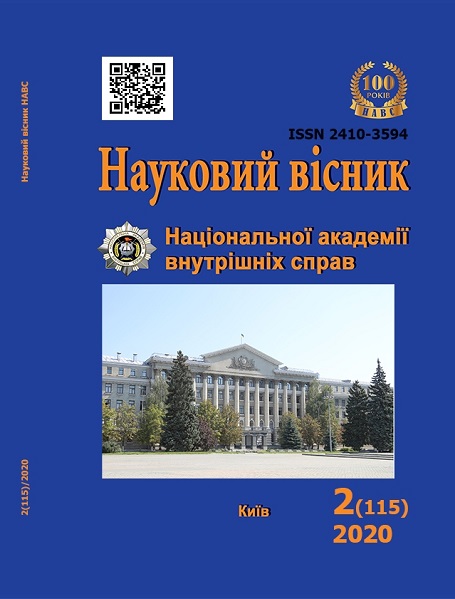Specific Issues of the Implementation of the Roman Statute on the International Criminal Court
Abstract
The purpose of the article is to reveal the essence of the nature of the Roman Statute; to determine the ways of implementation of the Rome Statute by the states-participants of the Rome Statute; to determine the method of implementation of the Rome Statute for Ukraine. Methodology. The methodological basis of the study are methods and techniques of scientific knowledge. In particular, the formal-logical method was used to establish the essence of the methods of implementation of the Rome Statute. Methods of analysis and synthesis allowed to construct theoretical constructions of methods of implementation of the Roman statute. The scientific novelty lies in the formulation of ways to implement the Rome Statute. The Rome Statute is a special international treaty. It is a general multilateral treaty that establishes rules of interest to all interested member states of the international community – the Statute formulates the corpus delicti of crimes that affect the entire international community. Conclusions. The provisions of the Rome Statute can be implemented into national law in the following ways: 1) the adoption of a single piece of legislation covering all implementation issues (however, it needs to be clarified that such a law will take precedence over existing law in the event of conflicts between ISS, and other legislation); 2) amendments to all relevant legislative documents separately: to the Constitution, sectoral codes or laws (since amendments to the Constitution are a complex and multi-stage process, this approach is the most complex, but it most fully reflects the recognition of the ICC jurisdiction); 3) making changes and additions to the relevant legislation, accompanied by the adoption of special legislation on cooperation with the ISS. Ukraine as a «third state» is not a completely «foreign» foreign state in relation to the Rome Statute. Although Ukraine did not ratify the Rome Statute, at the same time signing it, it agreed with the norms of international law enshrined in the Statute. At the same time, Ukraine’s appeal to the International Criminal Court twice in accordance with Art. 12 (3) of the Rome Statute is a solid basis for its ratification by Ukraine. In our opinion, the best way to implement the Rome Statute for Ukraine is to amend the relevant legislation, including the Criminal Code of Ukraine, the Criminal Procedure Code of Ukraine, the Criminal Enforcement Code of Ukraine, etc., accompanied by the adoption of the Law of Ukraine «On Cooperation with the International Criminal Court».
Keywords: Rome Statute; International Criminal Court; legislation; international treaty; implementation; methods of implementation.
Downloads
References
Білоус О. В. Процесуальні гарантії дотримання прав людини і громадянина в діяльності органів судової влади. Journal «ScienceRise: Juridical Science» 2019. № 2 (8). С. 34–38. doi: https://doi.org/10.15587/2523-4153.2019.173450.
Даниленко Г. М. Статут МКС и третьи стороны. Римский устав Международного уголовного суда : коментарий : в 2 т. / ред. A. Кассезе. М., 2002. Т. 2. 150 c.
Документ ООН A/61/217 9 окт. 2006 г. URL: https://undocs.org/pdf?symbol=ru/A/61/PV.26.
Кононенко В. П. Доказування в міжнародному суді ООН. Правова держава. 2018. № 32. С. 176–182. doi: https://doi.org/10.18524/2411-2054.2018.32.149585.
Конституція України : Закон України від 28 черв. 1996 р. № 254к/96-ВР. URL: https://zakon.rada.gov.ua/laws/ show/254%D0%BA/96-%D0%B2%D1%80.
Костицький М. В., Камінська Н. В., Кушакова-Костицька Н. В. Перспективи вдосконалення діяльності Конституційного Суду України в умовах сучасних суспільних трансформацій. Journal «ScienceRise: Juridical Science». 2019. № 3 (9). С. 4–11. doi: 10.15587/2523-4153.2019.180113.
Кримінальний кодекс Фінляндії (39/1889, включені зміни до 766/2015). URL: https://finlex.fi/en/laki/ kaannokset/1889/en18890039.pdf.
Мююлерсон Р. А. Соотношение международного и национального права. М. : Междунар. отношения, 1982. 136 с. URL: http://www.cawater-info.net/bk/water_law/pdf/myullerson.pdf.
Мирошниченко Т. М. Реалізація засади поваги до людської гідності у ході кримінального процесуального доказування. Проблеми законності. 2019. Вип. 146. С. 216–225. doi: 10.21564/2414-990x.146.172503.
Пронюк Н. В. Сучасне міжнародне право : навч. посіб. Київ : КНТ, 2010. 280 с.
Римський статут Міжнародного кримінального суду : міжнар. док. від 17 лип. 1998 р. URL: https://zakon.rada.gov.ua/laws/card/995_588.
Савельев В. А. Имплементация Римского статута Международного уголовного суда: общие вопросы, взгляд на международный опит. Юриспруденция. 2010. № 8. URL: http://pravorggu.ru/2006_8/saveleva_v_25.shtml.
Schabas W. The International Criminal Court. A Commentary on the Rome Statute. 1st Edition. Oxford : Oxford University Press, 2010. 290 p.
Сенаторова О. В. Юрисдикція Міжнародного кримінального суду щодо ситуації збройного конфлікту в Україні. Застосування норм міжнародного гуманітарного, національного кримінального та кримінального процесуального права в ході проведення антитерористичної операції на Сході України : матеріали міжкафедр. круглого столу (Харків, 12 лют. 2015 р.). Харків : Нац. юрид. ун-т ім. Я. Мудрого, 2015. 132 с.
Верле Г. Принципы международного уголовного права : учебник / пер. с англ. С. В. Саяпина. Одеса : Фенікс ; М. : ТрансЛит, 2011. 910 с. URL: https://www.academia.edu/28384405/%D0%93%D0%B5%D1%80% D1%85%D0%B0%D1%80%D0%B4_%D0%92%D0%B5%D1%80%D0%BB%D0%B5_%D0%9F%D1%80%D0%B8%D0%BD%D1%86%D0%B8%D0%BF%D1%8B_%D0%BC%D0%B5%D0%B6%D0%B4%D1%83%D0%BD%D0%B0%D1%80%D0%BE%D0%B4%D0%BD%D0%BE%D0%B3%D0%BE_%D1%83%D0%B3%D0%BE%D0%BB%D0%BE%D0%B2%D0%BD%D0%BE%D0%B3%D0%BE_%D0%BF%D1%80%D0%B0%D0%B2%D0%B0_%D0%9E%D0%B4%D0%B5%D1%81%D1%81%D0%B0_-_%D0%9C%D0%BE%D1%81%D0%BA%D0%B2%D0%B0_2011_%D1%81%D1%82%D1%80._1_-_210.
Віденська конвенція про право міжнародних договорів : міжнар. док. від 23 трав. 1969 р. URL: https://zakon.rada.gov.ua/laws/show/995_118.
Abstract views: 598 PDF Downloads: 418
- Authors reserve the right to authorship of their own work and transfer to the magazine the right of the first publication of this work under the terms of the Creative Commons Attribution License, which allows other persons to freely distribute published work with mandatory reference to authors of the original work and the first publication of an article in this magazine.
- Authors have the right to enter into separate additional agreements on non-exclusive dissemination of the work in the form in which it was published in the journal (for example, to post an article in the institution's repository or to publish as part of a monograph), provided that the link to the first publication of the work in this journal is maintained.
- The journal's policy allows and encourages the posting of articles by authors on the Internet (for example, in electronic storehouses of institutions or on personal websites), both before the submission of this manuscript to the editorial office and during its editorial processing, as this contributes to the creation of a productive scientific discussion and positively affects the efficiency and dynamics of citing the published work.




